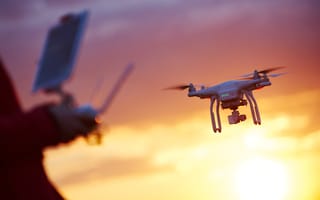Commercial drones may be on the horizon. NPR reports that federal regulators have announced intentions to lift restrictions on drone operators who have been unable to fly drones over populated areas and at night without obtaining special permits.
It appears that Transportation Secretary Elaine Chao had heard the complaints of drone operators who argued the limits were reductive. Drone operators with proper training and drones with anti-collision lighting are conditions of loosening this ban.
"This will help communities reap the considerable economic benefits of this growing industry and help our country remain a global technology leader," said Chao in a speech at the annual meeting of the Transportation Research Board, the world’s largest gathering of transportation professionals, in Washington, D.C., Monday.
This step could enable the use of drones for a wide array of applications, from survey construction sites to medical supply delivery, says NPR. Alphabet (Google’s parent company) and Amazon are two of many companies eager to test package delivery by drone.
Skyrocketing drone adoption has altered the skies in the United States over the past few years. According to Chao, by mid-December the FAA had registered nearly 1.3 million drones and more than 116,000 drone operators.
"The department [of Transportation] is keenly aware that there are legitimate public concerns about drones concerning safety, security and privacy and recent events overseas have underscored these concerns about the potential of drones to disrupt aviation and the national airspace."
Troubling incidents involving drones in U.K. airspace, however, have not escaped Chao’s radar.
"The department [of Transportation] is keenly aware that there are legitimate public concerns about drones concerning safety, security and privacy," she said, elaborating, "and recent events overseas have underscored these concerns about the potential of drones to disrupt aviation and the national airspace."
Regulators are in the process of creating regulations to prevent such scenarios as well as national security threats and privacy issues, assures Chao.
NPR explains that before these proposals to lift the aforementioned restrictions on flying drones at night and over people, the new rules must be published in the federal registry, which will likely take place post-partial government shutdown. The public would then be able to provide feedback about the rules over a 60-day period.



